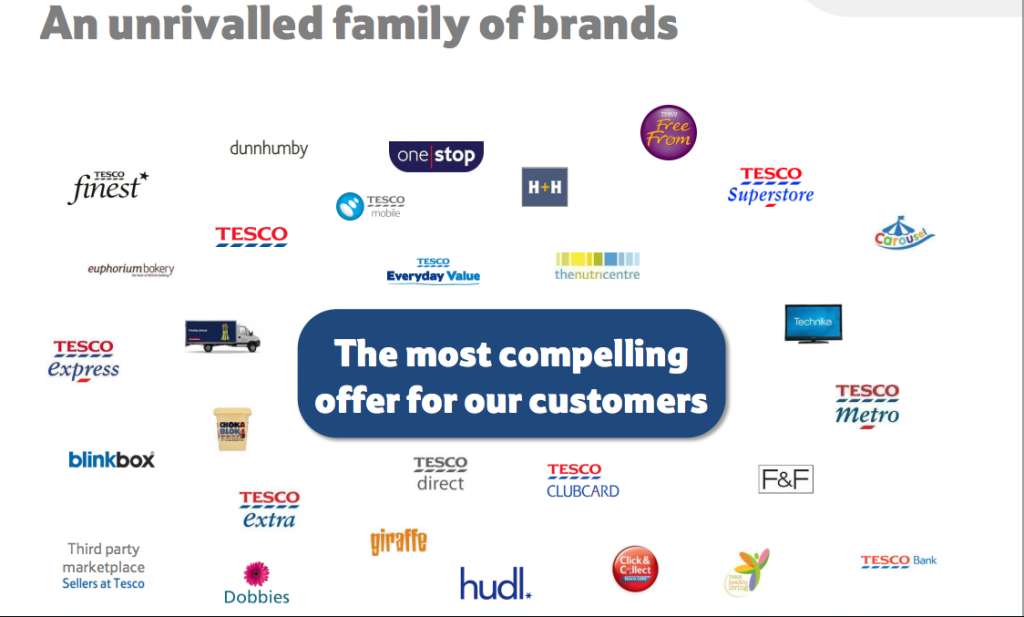The 12 days of Dave Lewis – No.5 – Subsidiary Businesses

Steve Dresser
Founder of Grocery Insight & retail influencer
"The man supermarket CEO's turn to" - BBC"

Without trying to ensure the Grocery Insight blog becomes somewhat of a tragic obsession of writing solely about Dave Lewis and Tesco, they are extremely newsworthy at the minute, and part of the wider Grocery Insight service offering is all about monitoring the market, spotting trends and activity in the shops. There’s plenty to look and consider with the Tesco empire. The 12 days of Christmas Dave Lewis are all about tracking the 12 days before the announcement to the City on the 8th January which will highlight where the business goes next. This, as ever is all guesswork on my part as nothing has been given away to the City, journalists or otherwise.
If you will, it’s a list of priorities that I’d be looking at targeting ahead of a major announcement to the stock market. They all interlock as, well, they’re all linked to the business but some are intrinsically linked. Clubcard for example directly cycles back to price (investment in Clubcard could be ploughed into lower prices) alongside other elements (Dunnhumby?) Tesco invested heavily in Christmas (part of the latest profit warning) and the 49p ‘Festive Five’ was popular and took the fight back to the discounters.
Today; we consider the role of the subsidiary businesses in the new Tesco world.
With Philip Clarke trying to take over the digital world alongside the standard, bricks and mortar world, Tesco managed to pick up a number of subsidiary businesses that would implant themselves into larger stores and the link between the online / offline Tesco world. The key ‘bridge’ for all of this was Hudl, a tablet produced by Tesco that came pre installed with apps and allowed linkage between all the various Tesco brands.
This is a supermarket that sells Beans to the general public.
The Hudl aside, a number of other brands were added to the Tesco world; pre Philip Clarke; Sir Terry Leahy added Dobbies to the estate which on the face of it made perfect sense. Overspaced stores could presumably fit in a garden centre surely? Well it would appear not, save for a couple of small trials and a few joint sites (Kings Lynn to name one) – nothing much else has been made of the ownership.
There were also other brands added when Philip Clarke decided to take the chain upmarket and focus on food too; Euphorium and Harris & Hoole were taken into the Tesco family by the way of a stake in the business, these chains then had their wares exposed to the masses in a number of predominantly London stores.
Nutricentre was purchased in 2001 (50% actually for £3m) but the business itself hasn’t done a great deal bar being rolled into numerous Extra stores. However if you drill into the pricing, their products significantly more expensive than everyday products that are located on the aisles nearby… Customers aren’t stupid.
Anyway – here’s a whistle stop tour of what Dave Lewis may / may not decide to do with this ‘unrivalled family of brands’. (I shall exclude the own label tiers (they will remain??) and supermarket formats etc as we have covered those).
The problem is that a number of these subsidiary businesses probably aren’t worth much in their own right, however ridding the business of some of the distractions can send out a message of where the focus will be.
Dunn Humby
One of the Jewels in the Crown, a youth team prospect nurtured to a worldwide superstar (think Steven Gerrard when he nearly went to Chelsea) and there is real brass (money) to be had here (as we say in Yorkshire.) Lewis himself noted that nothing was off the table when it came to assets. Nor should it be with the debt levels and threats of junk status for the credit rating….
DunnHumby exists to make sense of the data that Tesco generate via Clubcard and the insights are used by Tesco, sold to suppliers and the wider retail world. Indeed, their site showcases some of the retailers overseas who also use the DunnHumby package to extract insights on their customers – Metro, Groupe Casino and Macy’s to name but three.
The business has grown and with it has the value of the Tesco stake which grew from 53% to 84% before buying the rest of the shares to own the business outright. As Dave Lewis said himself, if he can get the insight from it without owning it, then it needs to be looked at.
Verdict – Likelihood of a sale is relatively high, especially with the business valued at some £2bn. Assuming Tesco still can get at the insights they want if the business is sold.
Tesco Mobile
I think the Mobile business has a place in the Tesco of the future, particularly with smartphone usage at an all time high. The business appears to perform well enough and their in store units are useful in terms of attracting customers. Each one I see usually has customers inside, the tariffs are good and the business has a good reputation in the main.
Verdict – I’d be surprised if this is on the list, the business appears to perform well and strategically has a future with Tesco given the ongoing growth in the channel.
One Stop
The chain could well be spun off but it would be unlikely, the business has a place within the group with smaller outlets able to trade under the One Stop banner, a concept discount format has opened in 3 stores too.
Verdict – Highly unlikely anything will happen with One Stop
Harris & Hoole
Never really understood the point of H&H beyond London, and I don’t understand the point of part owning the business if there is no mass market rollout. Again, we’re back to the Hudl, if you can’t lead the market (or be 2nd) then why enter the market? H&H has a place as an upmarket, artisan Coffee shop in affluent London boroughs, it is not set up for mass market, quick service as is expected by customers inside a supermarket for example.
The rollout of the chain has been slow with a number of outlets dropping into stores like Hatfield, Tooley St and Watford but nothing further north. Whether the brand would work as far up as here would remain to be seen, the infrastructure is within the M25 in any case.
Verdict – Likely to be seen as non-core by Dave Lewis, part owning a Coffee chain that is predominantly London based makes zero sense. Not when the likes of Costa are happy to drop their outlets into space and are experienced franchise operators, however whether it would generate any return remains to be seen.
Nutricentre
An odd business, designed to take on Holland&Barrett but with little progress made, save for numerous implants in the propositional extra stores. There is also one in Dudley in one of the early Extra format changes. The prices are excessive compared to standard products within the core Tesco range.
What problem does it solve for a Tesco customer? The limited store roll out indicates that it isn’t something that is being felt on a widespread basis.
Verdict – It is difficult to see what role the business plays now, however it does lose money by all accounts and will it ever contribute to Tesco?
Euphorium
Launched to wide acclaim in central London, and their products are excellent with Kensington, Tooley St and Watford to name but three alongside a ‘to go’ offer in a number of the Express stores in the capital. However we are in the realms of being London centric once again. Is there a benefit to part owning Euphorium? As opposed to perhaps just using them as a 3rd party supplier?
The move to fill the Euphorium Bakery facility with production converted from stores that lost their in store bakery in the South/South East was a cost cutting decision. Whilst the Bakery Project is a great concept, the loss of a scratch bakery to customers shouldn’t be underestimated. A blog on the Bakery move on this site has generated numerous comments as customers log on to express their disappointment.
Bread that isn’t as fresh, organic bread that is more expensive than the one it replaced and reductions in the range mean customers aren’t happy.
Verdict – The move to use Euphorium as a bakery for the stores in the South makes any divestment difficult, but it could be viewed that Euphorium doesn’t have a future beyond providing this 3rd party bakery / Cafe facility within Greater London.
Blinkbox
The blog identified Blinkbox as one of the top priorities for Dave Lewis, it is a service that loses money and offers little in the way of positives for the business. A little like the former manager’s star signing who isn’t actually any good; Blinkbox will be jettisoned elsewhere and it represents everything that was wrong with Tesco.
Netflix and Amazon LoveFilm / Instant; Blinkbox has too far a leap to make, putting a display in store or ranging the giftcards just doesn’t cut it. An example of the sheer amount of cash just wasted by the business.
Verdict – Go, cut price sale, it loses money so whether Tesco will even receive any cash remains to be seen.
Giraffe
Again, a difficult one to understand. Why not partner with the chain instead of owning them outright? Food service is hard work, and unless they’re opening in most Tesco stores then it seems an odd purchase. A number of propositional Extra stores have a Giraffe but I’d argue you could retain the same relationship with Giraffe / branded food service outlet if they had the space.
Further value could be driven for Tesco if branded Giraffe ready meals / products appeared in stores, but until then (if ever) then you have to question if it’s worth owning outright.
Verdict – 50/50 – The brand has equity and could be scaled into the core food range too.
Dobbies
As I opened with; Dobbies makes sense to solve the space problem however Tesco seem intent on not using the chain to solve any space issue. It seems a well run business and retains a number of standalone sites across the UK. A small trial in affluent superstores saw a range of Dobbies merchandise dropped into the seasonal fixture last Summer.
Verdict – The business impresses me, but does it stack up long term? Returns are unlikely to be outstanding if sold; working on integrating the chain into Tesco would be a smarter move.
That’s it! I’ve come to the end quicker than expected with the in depth blogs I’ve done – ones like the above certainly cut down the points needed!
All eyes on Thursday for Dave Lewis and the future; it does at least, look a bit brighter for Tesco.
A weekly email covering the latest events in the industry; such as Tesco store operations, store visits or new promotional packages are all covered. Please visit our emailed retail insight page for further information.
Grocery Insight provide market insight on the UK sector with a focus on individual retailers such as Tesco. This insight is useful to various stakeholders and due to my store based focus. Insight can be delivered to suppliers to focus on growth opportunities, analysts and investors to assess the business performance and long term outlook and retailers themselves to assess best practice.
